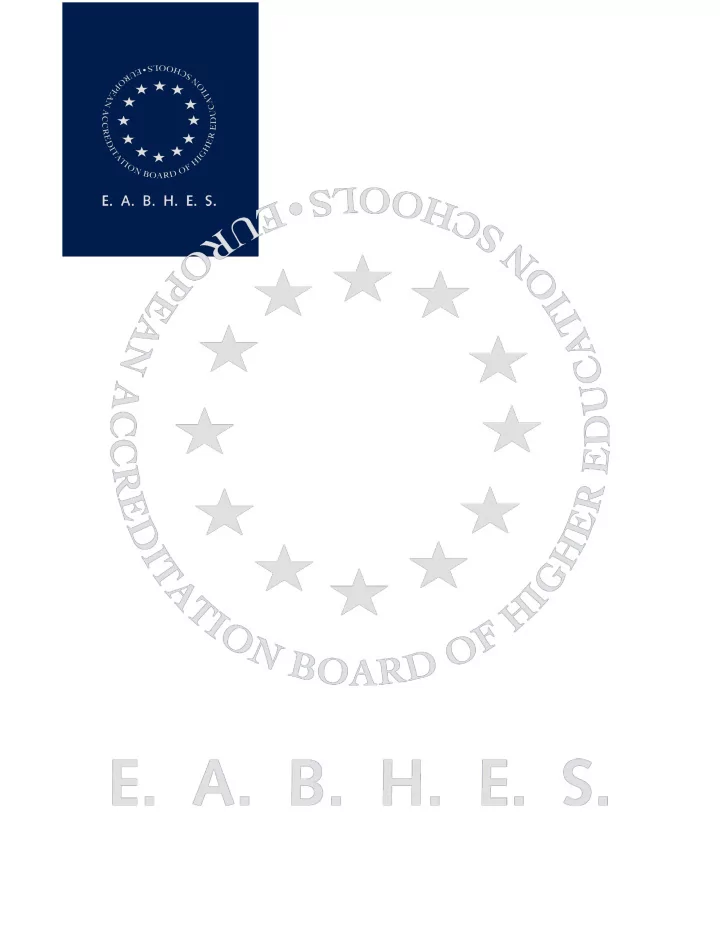

Being E.A.B.H.E.S Being European By joining the E.A.B.H.E.S community as an Active We are here to fully support the growing need of both or Associate Member, educational institutions guaran- students and institutions to explore the endless possi- tee their relevance and participation in the process that bilities of study abroad programmes, students and fac- revolutionized the educational system of the European ulty exchanges and professional networks. The Accred- continent. itation Process itself dedicates an important part to the strive for internationalisation, while the Post Accredi- E.A.B.H.E.S follows the genuine beliefs and guidelines tation Services are aimed at increasing and improving set by the E.H.E.A and, together with its schools and international affairs and networking of the Member partners, provides accreditation, assistance and consult- Institutes. ing services inspired by the resolutions of the ongoing work of the Bologna Process. Being Profitable The E.A.H.B.E.S accreditation contributes to the eco- Being Academic nomic stability of schools and institutes by providing Education and professional training are the reflection of the accredited programmes with a highly commer- the accumulated experience of each E.A.B.H.E.S member cial and sellable profile. The critical majority of pro- institute as well as the unique result of local and national grammes accredited by E.A.H.B.E.S are proven to be traditions, mentality and the particular ingredients that strategic and highly profitable for their schools and distinguish each nation and make diversity a great advan- become the foundation for further advancement in the tage. schools’ evolution towards professional upgrade, and a critical contribution to their local and international rep- As an Active Member of E.A.B.H.E.S, you can translate utation. collective know-how and experience into a universal aca- demic language, enabling the promotion of international academic dialogue with all other educational and training The Importance of E.A.B.H.E.S Accreditation institutions within the E.H.E.A. It helps develop the tools needed for students to pursue studies in another school, within the country of origin or The accreditation process is a substantial contribution abroad, by providing clear international recognition of the to the students, faculty and staff of the institutes that level of study and its corresponding academic courses. are the first to earn an “entrance pass” to an interna- tional academic community whose goals and profes- It provides competitive positioning for graduates in a glob- sional aspirations have become a reality. al job market. Being Mobile It helps improve the students’ level of the English lan- In 2009, the Leuven/Louvain-la-Neuve Communiqué guage or the language of the country of study , a major (a part of the Bologna Process Biennale meetings) set a factor in international communication, while obtaining an benchmark of 20% of student mobility by 2020 that re- official certification. flects the society in which academic institutions exist and the environment they will send their students to work at. It enables institutional commitment to students pursuing lifelong learning. The E.A.B.H.E.S accreditation and ongoing services of post accreditation are a great tool to enable your students’ It offers the possibility of interning abroad due to the ac- mobility, easing the reciprocal recognition of studies com- quired language certificate and the completion of an inter- pleted within the E.A.B.H.E.S community and with other nationally recognizable study programme. academic institutions around the world.
FYI Bachelors’ and Masters’ Degrees The Bologna Process aims at ensuring the comparability of academic programmes and promote international mobility through the creation of a system based on three Higher Education cycles and the implementation of an accumulation and transfer of credits system, known as the E.C.T.S. system. Bachelors’ and Masters’ Degrees are, originally, Anglo-Saxon and North American degrees. A Bachelor’s degree is the first Higher Education qualification an institution can obtain whilst a Master’s degree is the second. The fields of study that these degrees cover are extremely varied and the domain of each degree depends on the area of study: Bachelor/Master of Arts, of Fine Arts, of Science, of Science in Business, in Hospitality Management, in Design, and so on. Specialties (Majors) and options (Minors) are infinite and depend on the development of the programme. There are two types of Master’s degrees: a professional Master’s degree and a research Master’s degree. They are achieved by accumulating credits each year, earned in equivalence to the Teaching Units taken over the course of study. These credits are registered throughout the year and are recorded at the end of each year in an annual Transcript of Records. Credits can be earned for any subject, provided courses have been passed and attendance has been regular. Elective courses enabling students to strengthen their skills, widen their knowledge or learn new competences and allow students to earn additional credits. Extracurricular activities may also lead to extra credits (eg. trips, exchanges, contests, humanitarian action). E.C.T.S. Credits The European Credit Transfer System (E.C.T.S.) is a student-centered system based on the workload students have to undertake in order to meet the objectives of an academic programme, which are defined in terms of learning outcomes and skills to be acquired. A numerical value that reflects the overall amount or work to be provided by the student in order to meet the pro- gramme’s objectives is attributed to each Teaching Unit. E.C.T.S. makes it easier to understand and compare study programmes for both local and international students. It also facilitates international mobility and academic recognition. ‘It’s important to keep differences alive, but since young people are at the heart of this project and since they are going to live in this peaceful, civilized and stable zone, and have the best possible chances to live and to succeed thanks to this European project, we need to encourage exchanges, bridges between schools, mutual recognition of diplomas on both sides of national barriers…’ M.B.(Member of the European Commission)
Recommend
More recommend